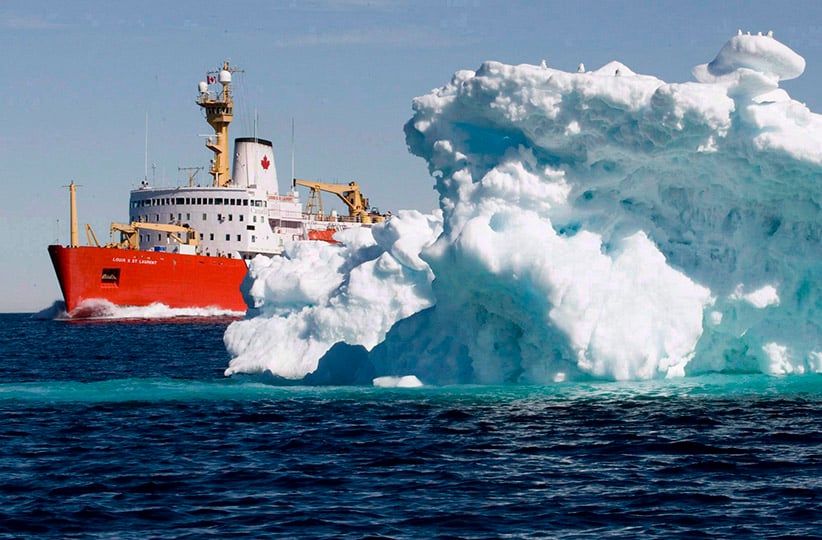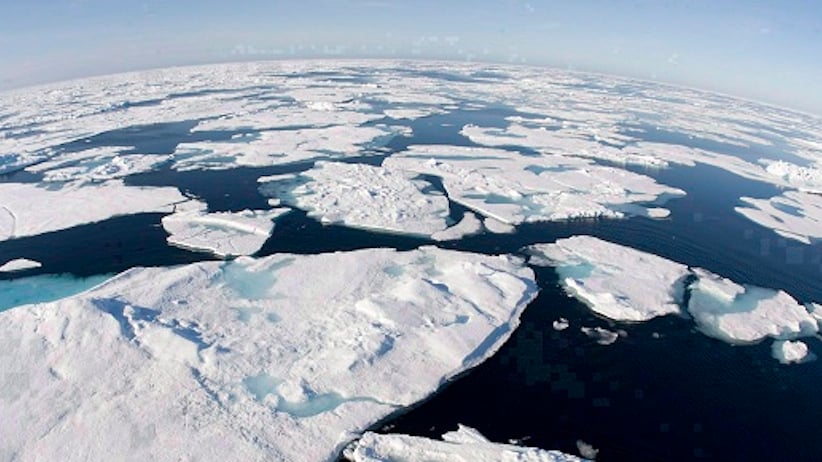Vladimir Putin, Justin Trudeau, and Canada’s Arctic problem
All of Moscow’s effort and attention, combined with Canada’s neglect, has effectively turned the Arctic Ocean into Putin’s Lake.
Russia’s Prime Minister Vladimir Putin uses a pair of binoculars during his working visit to the Siberian Khakasiya region near Karatash settlement outside the city of Abakan February 25, 2010. (Ria Novosti/Reuters)
Share

Justin Trudeau recently promised to push back “the bully that is Vladimir Putin.” Supporters may enthusiastically imagine the tall boxer staring down the short black belt. Unfortunately, the more accurate picture would have Trudeau sitting on a battered snowmobile, craning his neck to see Putin standing far above him on the bridge of a nuclear-powered icebreaker.
Canada has an Arctic problem: our northern marches are increasingly important to us and others, but no Canadian government has ever made even the minimum investments necessary to safeguard it.
The Arctic region is thought to contain 13 per cent of the world’s undiscovered oil and a third of its undiscovered natural gas. Within our territory there are vast deposits of nickel, iron and diamonds. By some estimates, Canada’s share of the resource capital could exceed $20 trillion, more than 10 times our GDP.
The geopolitical value of the Arctic is equally substantial. Shrinking ice caps have opened new shipping lanes. The Northwest Passage shaves four days off the trip from Europe to Asia. Russia’s “Northern Sea route” reduces transit time by two weeks and already sees more than a million tons of cargo annually, most of it oil.
Our politicians are quick to agree the Arctic is critically important. The former prime minister would say so on his annual summer pilgrimages. He echoed Paul Martin, who managed three trips there during his short tenure. Jean Chrétien even brought Jacques Chirac to Pangnirtung. There, the French president stood in front of the old blubber station and made the cryptic observation that the empty views had made the Inuit “very elegant.” Maybe, but the emptiness has also left them extremely vulnerable.
The suicide rate is seven times the Canadian average. The murder rate is 10 times higher. And only 30 per cent of Inuit children live in households that are able to provide them with sufficient food. We have almost no Northern infrastructure. There are a small handful of airports, no deep-water ports, precious few telecom links, limited health care facilities and a few short roads. Canadian Arctic search and rescue helicopters are based in British Columbia and the Maritimes. Our few icebreakers are decades-old, frail, and cannot even operate in the winter. Prime ministerial visits aside, Canada’s North remains utterly neglected by Canada’s South.

The Russian Arctic is different. The north has always been an important part of their national identity, as has the military. It is not surprising then that eight of the 10 largest cities within the Arctic Circle are Russian (none are Canadian—our largest city is Inuvik, which is 0.01 per cent the size of Russia’s largest northern city, Murmansk). Russia just completed its largest of 10 military bases in the Arctic; it will house more than 150 troops and includes a deep-water port and submarine facilities. By contrast, Canada has spent six years discussing the Nanisivik Naval Facility, the only movement being to downgrade the plans from a port to a refuelling depot. All of Moscow’s effort and attention, combined with the world’s largest fleet of icebreakers, has effectively turned the Arctic Ocean into Putin’s lake.
While Russia’s relative stature has declined (its GDP is only marginally above Brazil and the military budget is on par with Saudi Arabia), in the Arctic it remains the sole superpower. Without challengers, Putin has felt free to expand their territorial and military ambitions right up to the North Pole, and possibly beyond. In some circles, the increasingly active Russian bear is setting off alarm bells, and a fear (as Stephen Harper put it) that when it comes to the Arctic, we must “use it or lose it.”
But as Thomas Axworthy, a senior fellow at the Munk School, points out, the very dominance that makes Russia a potential northern threat, has also made Russia far more co-operative. Unlike in the Syrian or Ukrainian context, its undisputed position does not require a bellicose strategy. Up north, a rules-based international system works in Moscow’s favour. As evidence of this, observers report Russia has been very constructive within the Arctic Council, the primary inter-governmental forum for northern matters (while Canada has been less engaged).
This should provide Prime Minister Trudeau with a small measure of comfort. We are unlikely to see Russian icebreakers steaming defiantly past our ragtag force of part-time Canadian Rangers in the short term. But this does not mean that Ottawa can continue to delay billions worth of long-needed investments in everything from hospitals to military bases. Otherwise, Canada’s Arctic problem is only going to get worse.
Scott Gilmore is a Conservative appointee to the board of the International Development Research Centre and he’s married to the new Liberal minister of the environment. His full disclosures can be read on his LinkedIn page.